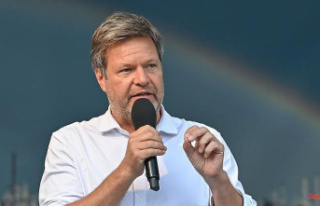It is still unclear whether and for how long the German nuclear power plants should continue to operate in order to counteract the energy crisis. The TÜV sees no problems for continued operation, but new fuel rods are required for continuous operation - which would not be so easy to obtain.
The managing director of the TÜV Association, Joachim Bühler, believes that the three nuclear power plants that were shut down at the end of last year can be put back into operation quickly. These are the piles of Brokdorf (Schleswig-Holstein), Grohnde (Lower Saxony) and Gundremmingen C (Bavaria). Bühler told the "Bild" newspaper that it would be "not a question of years, but rather of a few months or weeks" - and above all a question of political will. "We are convinced that the three power plants are in a state of safety that would make it possible to put them back on the grid." The nuclear power plants are among the safest and technically best in the world.
The background to the debate is the throttling of gas supplies from Russia to Germany. Natural gas is mainly used for heating. But it also contributes around 10 percent to electricity production in Germany. If you were to rely on nuclear energy for longer, you could use more gas for heating. There are currently three nuclear power plants still connected to the grid in Germany: Emsland in Lower Saxony, Isar 2 in Bavaria and Neckarwestheim 2 in Baden-Württemberg.
According to current law, they must be switched off by December 31, 2022 at the latest. Chancellor Olaf Scholz wants to wait for the results of a second stress test on the security of the power supply before making any decisions, as a government spokeswoman said.
Also under discussion is an extended operation of the reactors, so the nuclear power plants would first be throttled so that they can then be operated with the existing fuel rods beyond the turn of the year. If longer-term operation is then targeted, new fuel rods will be required.
CDU leader Friedrich Merz has called on the federal government to immediately procure new fuel rods for the three remaining nuclear power plants in Germany. Not only a temporary stretching operation with old fuel rods can be maintained. "We have to allow continued operation until the risk of a bottleneck has been eliminated." The time to order new fuel rods is running out. Economics Minister Robert Habeck must act now to avoid a power shortage in winter.
The Greens politician does not rule out the continued operation of the remaining nuclear power plants in Germany beyond the end of the year under certain conditions. A "special scenario" could arise during the so-called stress test, Habeck said on Tuesday at "RTL Aktuell". "The relevant question that needs to be asked is whether the electricity grid stability needs to be secured through further measures this year." In contrast, the possibilities for saving gas from nuclear power plants are "very, very small," stressed Habeck. The savings potential, which he estimated at around 0.5 to 0.7 percent, is disproportionate to the risks of nuclear power and the social debate that would be triggered by continued operation.
However, procurement could be a problem. A spokeswoman for Eon's nuclear subsidiary Preussenelektra pointed out in March that the delivery of new fuel rods would take time: "According to an initial estimate, we assume that fresh fuel elements could be available in a good 1.5 years," said them the "Rheinische Post". In addition, the corporations may have to look for new uranium suppliers. "In the last few years of operation of our power plants, we obtained the uranium required for the fuel elements from Kazakhstan and Russia and in small quantities from Canada," said the spokeswoman.
The federal government had asked nuclear power plant builder Westinghouse for information from "The Pioneer" about how quickly fuel rods would be available. According to media reports, the Swedish-American supplier had promised to be able to deliver faster. However, it is unclear whether Westinghouse would be a reliable partner. The group is involved in several scandals in the United States. Several top executives have been charged with allegedly withholding information about the lack of progress on the now-defunct multi-billion dollar expansion project at US's Summer nuclear power plant near Jenskinsville.












